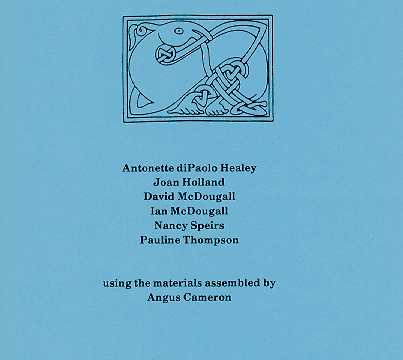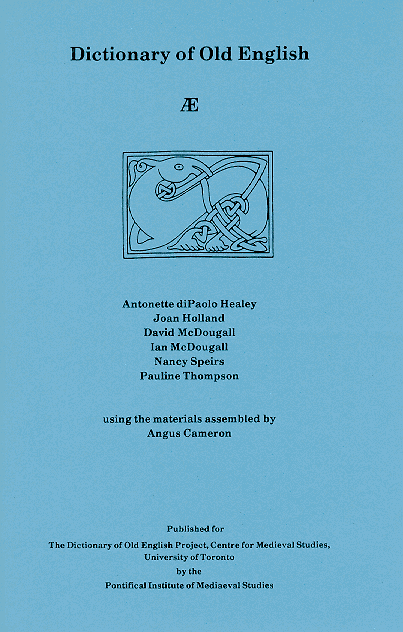1992 – 3 fiche. ISBN 0-88844-923-2 $11.00 for the set
Order from the Pontifical Institute of Mediaeval Studies (PIMS)
Beon (Supplement to Fascicle B) by Matti Kilpiö (1 fiche)
Abbreviations for Latin Sources and Bibliography of Editions by Pauline A. Thompson (50 pp)
These new additions to the Dictionary of Old English include the fourth fascicle, the letter Æ, consisting of 617 headwords in 771 pages on microfiche; the entry on the substantive verb Beon, issued as a supplement to Fascicle B, on 49 pages of fiche; together with a bibliographical handlist of Latin short titles which have been used in Fascicles Æ and Band which will be adopted in forthcoming fascicles.
Although the Dictionary of Old English is meant to serve as a bilingual translation dictionary, it is also a historical dictionary, an inventory and description of the English language from its earliest appearance in written records, ca. 600. It is intended to complement the Oxford English Dictionary for the earliest period of the language; indeed, the Dictionary of Old English will catalogue the Old English vocabulary deliberately excluded from the OED because it failed to survive past 1150.
The Dictionary draws on as wide a range of texts — in date, dialect and genre — as possible. It differs from previous dictionaries in several important features: a listing in a simplified paradigmatic order of every spelling which is attested for a word in the Electronic Corpus; frequency counts for each word in the corpus so that readers can know what proportion of the evidence has been cited; usage labels where they are statistically significant, noting restrictions to a class of texts, to an author, or to a particular period or dialect; exhaustive citation for all words of twelve or fewer occurrences.
Fascicle Æ was prepared by Antonette diPaolo Healey, Joan Holland, David McDougall, Ian McDougall, Nancy Speirs, and Pauline Thompson, using materials assembled by the late Angus Cameron. The entry on Beon was written by Dr Matti Kilpiö of the University of Helsinki, with attested spellings by Robert Millar, using materials assembled by Haruko Momma. The bibliography of Latin sources was compiled by Pauline Thompson, with the assistance of Robert Stanton.

